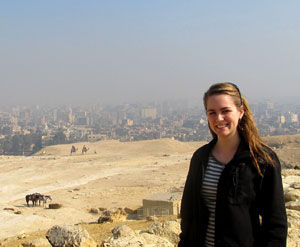History firsthand
I arrived in Cairo, Egypt only a couple of weeks before the January 25 protests began and was quickly trying to understand the people and the culture of Egypt. Much of this involved trying to get acclimated to the political climate of the country as politics seemed to affect people’s everyday lives
Most everyone I spoke to seemed to have harsh words to say about President Hosni Mubarak when I asked them about life in Egypt. Though not in my wildest dreams could I have imagined them screaming their opinions in the street.
“The walls have ears,” an Egyptian friend told me on January 24 when explaining why he did not want to talk about his political opinions in public.
The very next day, the protests began. Nobody—not experts or historians—thought their demands would be realized in just 18 days.
To be honest, my life was not very affected in those first few days of protests: on the evening of the 25th, I taught an English class in the outskirts of Cairo. Two days later, my group left on a scheduled trip to Luxor to see ancient temples and tombs.
As it turns out, we got to see something more reflective of recent history as well: from the rooftop of our hotel, we saw at least a thousand protestors calling for the resignation of Mubarak and a better economy. As I watched the news, I realized what I was seeing was a scaled-down version of the protest happening in Cairo and I began to wonder if maybe all those historians and experts were wrong.
That day, January 28th, my group was on hotel lockdown and the next morning we took a train back to Cairo. Arriving well after the 6 p.m. curfew, we spent the night in the unkempt train station and returned to our apartments the next morning. It was a long night, to be sure, but I spent much of it trying to cope with the news that I would be leaving the country in three days.
Though everything within me wanted to be angry at someone for this interruption to my semester, all I felt was a strange mixture of joy and sadness; joy because the Egyptian people were moving towards a better future but sadness because that meant leaving the country and people who had so wonderfully welcomed me in the past three weeks.
Though relieved to be within minutes of a hot shower and soft bed, the ride from the train station to my apartment was anything but easy. I saw tanks in the streets and a few burned cars. There were lots of men – both young and old – out on the streets to protect their neighborhoods from looters. Along the way these men had set up checkpoints to make sure people were not stealing things. Every time our taxi approached a checkpoint, they realize we were foreigners and flagged us on, apologizing for the inconvenience.
At one checkpoint, a middle-aged man put his face up to our driver’s window and looked each of us in the eye, “I’m sorry for the inconvenience,” he said. “Welcome to Egypt.”
Though this was a time that many would say Egypt and Egyptians should have been focusing on themselves, they never ceased to show immense concern for the safety of my classmates and I. It was because of people and sentiments like these that the only real fear I had while in Egypt during the shaky beginnings of a revolution was that that revolution would not succeed and that these people would still have to live under oppression. Thankfully, two countries and 10 days later on my journey, this fear was no longer necessary: Mubarak had resigned and there was dancing in the streets of Cairo.
Sari Heidenreich is junior journalism major at Messiah College who one day hopes to be covering revolutions like these for an international news agency. You can follow her travels in the Middle East on her blog at http://discoveriesinegypt.blogspot.com/.






February 28th, 2011 at 6:57 pm
Sari, you are already achieving your goal! Thanks for bringing the voice of the people of Egypt to us during such an historic time!
March 3rd, 2011 at 4:51 pm
This was very well-written. Thank you!